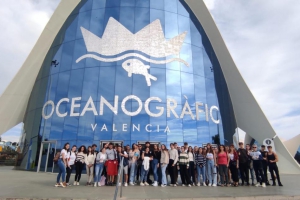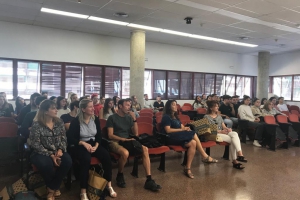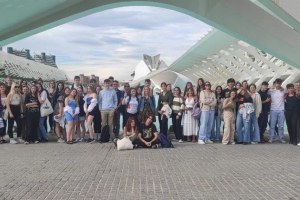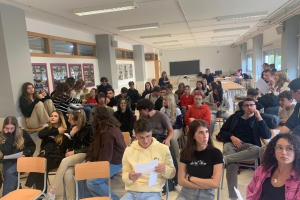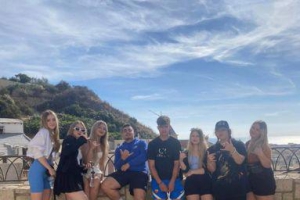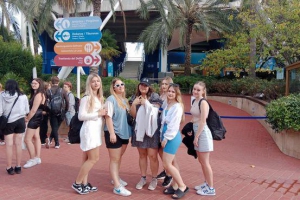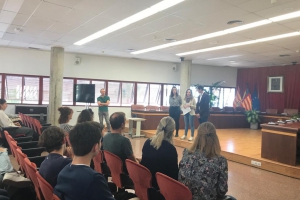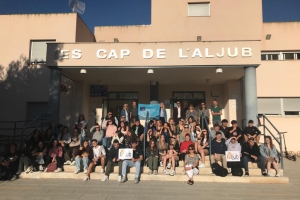The group of students from schools in Poland and France performed the mobility to Spain, where the hosts were the teachers and students from Institut Cap de l’Aljub in the town of Santa Pola. There were groups of 16 students from France, Poland and Spain what sums up to 48 students participating in the project during the mobility in Spain. The students were accompanied by assigned teachers – Weronika Galar and Bożena Bednarz from Poland; Murielle Mazeau and Maryline Andre from France. The host teachers in Spain were Jose Francisco Lopez Sempere and Maria Garcia Martinez. The arriving students were accommodated with hosts families or in a
The mobility lasted from 07th November to 11th November 2022.
During the mobility time students performed the activities which were discussed and set earlier – during the short-term joint staff exchange in France which took place in March 2022 and later on during the online meetings and e-mail exchange among the teachers and students from the schools.
The activities performed were all linked to the main idea of the project, which is „Water – a task for environmental responsibility”.
The mobility in Spain lasted five days and during each days different tasks were performed.
Day one – Monday, 07th November 2022:
Students and teachers visited the Spanish school Institut Cap de l’Aljub in Santa Pola. The groups were welcomed by the school authorities and teachers. The visiting students and teachers could see the classrooms and had a tour around the schoolplaygrounds where an open-air classroom and school gardens were presented to them. The students from Poland and France who stayed with Spanish families participated in the morning lessons with their Spanish host students. Later they shared the things they experienced with their schoolmates and teachers. After the school visit, all the groups were invited to the town hall of Santa Pola. The groups from Poland and France received a warm welcome from the city authorities and were given gifts from the town of Santa Pola. The next activity for this day was visiting the museum of salt in Santa Pola (Museo de la Sal). The Salt Museum is located in an old salt works within the Natural Park of Salinas, where salt water has been evaporated for centuries to make salt. There were viewing windows over the salt lagoons, which are an important habitat for wildlife that has been protected partly because it was needed for the salt industry. For our project it was important to see another way the salt water can be used – as a source of salt which is essential for all human beings.
The next destination was the site Salinas de Santa Pola which is an extensive complex of salt pans and marshes on the Mediterranean coast. It is a unique saline habitat where many unique and endemic species can be found. During the hike through the site, the Spanish biology teacher explained the uniqeness of this place and pesented the wetland species.
In the afternoon the students from all the groups compared the results concerning water consumption in the students’ households. The measurements were taken by all the students in monthly spans for half a year. The students were brainstorming about the methods of saving domestic water. Such topics as sustainable usage of water and the increasing problem of water shortage in the world were covered.
Day two – Tuesday, 8th November 2022:
The students and teachers visited Alicante. The main purpose of the visit was to get familiar with the problems with water in the city. Alicante has had these problems since it was founded. The tap water comes from ground water aquifers, surface water bought from other regions and desalination plants. This combination makes it possible to meet supply, although there is always a shortage. The Alicante area is classified as semi-arid, with scarce and irregular rainfall, no local surface water (lakes or rivers) and very high demand in the summer when the population increases from 335,000 to more than 800,000 at any time. Students visited the Water Museum and learnt about how the citizens had dealt with various water problems. They also learnt about different water contaminations and waterborn diseases. After visiting Alicante students worked in groups and preapred charts concerning main world problems with water scarcity and contamination.
Day three – Wednesday, 9th November 2022:
The students and teachers visited oceanarium in Valencia (L’Oceanographic de Valencia). They also had workshops there with the staff from oceanarium. The workshops were connected with the scientific projects which are held there, such as conserving the marine turtles, following up dolphins in open waters and conserving the biodiversity of sea floor. The students also discussed the matters connectes with the significance of water for all living organisms and water life biodiversity. During the lunch break students visited the nearby park and learnt about a Turia River. The Turia River flooded the city many times including the worst flood in 1957. It was then decided to divert the river around its western outskirts to the Mediterranean Sea. The old the riverbed was turned into the park students visited.
Day four – Thursday, 10th November 2022:
The main out of school activity was a boat trip to the Tabarca Island. The biology teacher from Spain gave lecture on the marine life in the Medditerraean Sea. The students learnt about the importance of the plant Posidonia Oceanica, commonly known as a Neptun Grass. It forms large underwater meadows that are an important part of the ecosystem. It has a high capacity to concentrate polluting substances in its tissues, but is very sensitive to environmental changes and therefore endangered. The students also discussed the lower course of the river which is typical for rivers flowing into the sea. They have already get acquainted with the middle course when they were in France.
Day fifth – Friday, 11th November 2022:
It was mainly the evaluation day. All the groups met at the school and worked in groups. The Spanish teachers preapred for each group a set of questions concerning different aspects of their mobility in Spain including both questions about water and cultural events. All the groups had students from the three participating countries. Afterwards each group presented the summary of their work. The teachers from Poland, Spain and France evaluated the mobilty and made arrengements for the next mobility which is going to take place in Poland in spring 2023.

